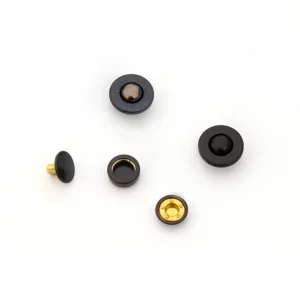The weight of custom metal buttons can vary based on several factors, including the type of metal used, the button’s design, and any additional features or embellishments. Generally, metals have different densities, and this influences the weight of the buttons.
Let’s compare the weight of custom metal buttons to other materials commonly used for buttons:
- Stainless Steel:
- Weight: Stainless steel is a relatively dense material, and buttons made from stainless steel can have a moderate to heavy weight, depending on the thickness and design.
- Brass:
- Weight: Brass is another metal commonly used for buttons. It is less dense than stainless steel but still has a substantial weight. Brass buttons can be moderately heavy.
- Aluminum:
- Weight: Aluminum is a lightweight metal. Buttons made from aluminum tend to be significantly lighter than those made from stainless steel or brass. This makes aluminum a popular choice for applications where weight is a consideration.
- Zinc Alloy:
- Weight: Zinc alloys, such as zamak, are commonly used in button manufacturing. The weight of zinc alloy buttons can vary, but they are generally lighter than stainless steel or brass buttons.
- Plastic:
- Weight: Plastic buttons are generally lightweight compared to metal buttons. custom metal buttons They are a popular choice for applications where a lightweight option is preferred.
- Wood:
- Weight: Wooden buttons are lightweight and can be a great alternative for those looking for natural materials with a lighter feel.
- Horn or Bone:
- Weight: Buttons made from natural materials like horn or bone can vary in weight, but they are generally lighter than metal buttons. They offer a unique, organic look.
- Shell or Mother of Pearl:
- Weight: Buttons made from shell or mother of pearl are lightweight and often chosen for their iridescence and elegant appearance.
It’s important to note that the specific design of the button, including its thickness, shape, and any additional elements like coatings or embellishments, can also impact the overall weight. Manufacturers may offer a range of options in terms of materials and finishes, allowing customers to choose buttons that meet their desired weight and aesthetic preferences.
When selecting custom metal buttons, consider the intended application, the desired appearance, and whether weight is a critical factor. Each material has its unique characteristics, and the choice depends on the overall design goals and functional requirements of the buttons.

